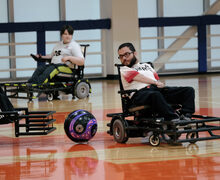Moreo: Hack look backs on being a woman in sports journalism
Two summers ago, at a Boeheim’s Army basketball game, I was speaking with a fellow photographer about his experiences covering the New York Mets, my favorite baseball team. I was 20 at the time, and he appeared to be about twice my age, maybe a bit older. We were chatting about photography, baseball and Citi Field. Then, he interjected.
“Hey, ya got a boyfriend?”
Both the setting and his tone made me realize that, to him, the conversation was not between two professional photographers. To him, it was between a man and a woman. To him, it was a surprise to see a woman know what she was talking about when it came to sports. To him, I wasn’t a photographer.

Courtesy of Alexandra Moreo
The man’s obnoxious comment that night had a similar, condescending tone to that of many others. It comes from an attitude by some men I’ve encountered in sports journalism. They feel superior. Yet when you consider the qualities that make a great sports photographer — telling the story, watching for moments, catching emotions— none of those qualities require being a man.
For two seasons, I photographed Syracuse men’s basketball, sitting along the baseline and in the media room for dozens of games. Usually, I was one of two women in a room of about 30 people. Sometimes, I was the only woman present. In each press room, I started to count — six of 50, once seven of 60. On the baseline, especially at away games, I was almost always the only woman photographing the game.
It isn’t about being a minority as a woman. It is about mistreatment, and the implicit bias toward women in sports. I faced a weird resistance and was judged critically by some men for what I did, sometimes what I said. As the exception in a male-dominated profession, I was questioned for my validity by fellow photographers, journalists and security guards. Colleagues ignored my presence. Throughout the past two years, I noticed a lack of acknowledgement for women in sports.

Courtesy of Alexandra Moreo
I’ve never been bothered by it. To me, each instance became a kind of disappointment at their motive, and how they thought what they said was OK.
Growing up in Goldens Bridge, New York, I lived on a street with 16 boys and four girls. I learned how to pop an ollie while my girl friends from school learned what makeup was. I made huts in the woods, whittled sticks and got pocket knives for my birthday from the other “tom boy” down the street. We smashed rocks with other rocks, raced down the street in our radio flyer. I enjoyed throwing a football around on Christmas, riding a skateboard and fishing.
It was never out of the norm to be surrounded by men until I became a journalist.

Courtesy of Alexandra Moreo
As a woman, you try to prove yourself in everyday life. As a young woman, it’s even worse. I’ve learned to ignore the murmurs I hear through the walls and the rumors that get back to you. I’ve learned to stop listening to the doubts.
To the photographers on the baseline: You don’t need to tell me — I know who that coach is, I know how many years they have been coaching. You don’t need to tell me whom to photograph, where to sit, what to look for.
To the younger woman photographers: Walk with purpose. Try to carry as little as possible. The less flashy the outfit, the more likely you’ll blend in. Continue to pretend you know what you’re doing, even if you don’t. Being 5-foot-2 shouldn’t matter. Representation in the profession matters. We’re all learning in one way or another. This is an evolving line of work, and you’re equally as qualified as everyone else.
In time, I believe the normalization will come, and women photographers will become more accepted. Last month, when I was photographing the NCAA Tournament in Salt Lake City, there was a photographer two seats away from me, who also was a woman. Moments before the game tipped-off, she turned to me. “I thought I was the only one,” she said. We high-fived, then got back to work.
Alexandra Moreo was a senior staff photographer at The Daily Orange, where her work will no longer appear. She can be reached at [email protected] and on Twitter @AlexandraMoreo.
— 30 —
Published on April 28, 2019 at 8:24 pm




